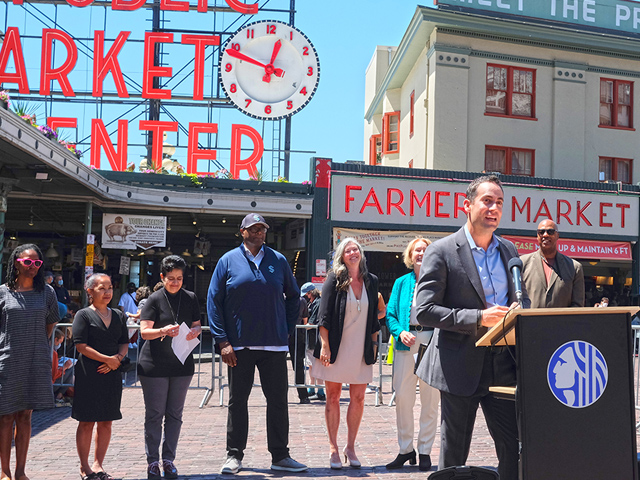News
Lorena González Doesn’t Have a Plan for a Downtown Recovery
Posted on

This op-ed by DSA President & CEO Jon Scholes was originally published in The Stranger on June 25, 2021
In a recent Stranger op-ed, City Council President and mayoral candidate Lorena González demonstrates how little she understands about the urban core of the city she seeks to lead and how divisive her approach to governing would be should she be elected mayor of Seattle.
González dismisses the significance of Seattle’s downtown to the economic, environmental and cultural health of the entire city and makes clear to Seattle voters that bringing divergent viewpoints together for the betterment of our community is not in her campaign’s playbook. In short, we shouldn’t expect her to govern or lead with a spirit of partnership or collaboration or work toward downtown recovery.
González begins her op-ed by listing her policy disagreements with the Downtown Seattle Association (DSA), leaving little doubt that unless you’ve been—and remain—in lockstep with her positions, your views, perspective and input won’t be sought. González makes clear that vendettas, division, lines in the sand and distortion are the plays we can expect from her administration.
Council President González dismisses downtown Seattle as a corporate castle that she can freely ignore. She has one thing right: there are large companies downtown; companies that are proud to call Seattle home. Innovators that have changed the way much of the world lives, works, recreates and shops.
These companies are part of an employment base downtown that accounts for more than half of all jobs and more than half of all business taxes generated annually within the city of Seattle. The jobs created by large employers represent customers for small businesses, arts and cultural organizations, and restaurants and retailers throughout the City. Talk to any operator of a downtown small business or cultural venue today and they’ll tell you that they desperately want these customers back after nearly 16 months of virtual work for many and virtually no customers for their establishment.
But downtown is more than a home to large employers. Downtown is where our region’s arts and cultural venues are located—from The Moore to the Croc to the 5th—brought to life by artists and stagehands that have been deeply impacted by the pandemic. Downtown Seattle is also where more than a third of Seattle’s low-income housing is located, where 14,000 small businesses operate each day, and where 84,000 Seattle residents live. In 2019, Seattle residents from neighborhoods outside downtown took a combined 62 million trips to downtown. That’s an average of 170,000 people per day coming from across all seven City Council districts to work, stroll the Market, take in a concert or game, or spend time with their kids at Seattle Center. This concentration of employment and visitor activity creates an economic engine unparalleled within the Pacific Northwest.
Council President González refused to answer a recent DSA candidate questionnaire asking about her plans to support downtown recovery to get the economic and cultural engine of Seattle going again. It was a telling refusal. Voters are left with no other conclusion: She doesn’t have a plan.
As a city, we’ve made a big bet that downtown Seattle thrives economically. We’ve adopted numerous citywide levies and tax measures to invest in universal preschool, affordable housing, a high-quality and accessible parks system, and continued expansion of bus and light rail service. Each of these investments that benefit our entire city presume and rely upon a healthy and vibrant downtown with robust economic activity that generates tax revenue to support investment in critical services and infrastructure.
Seattle voters understand this and know that it’s in everyone’s interest for downtown to come back stronger and better than ever following the pandemic. In a recent poll, 74 percent of Seattle voters reported being very concerned about the state of downtown and more than 80 percent believe that for the city to recover, downtown must recover. An overwhelming majority of voters also desire that the next mayor work with the business community to spur economic recovery.
At a time when Seattle faces its toughest challenges in at least 100 years, with more than 450 permanent street-level business closures; an arts and cultural sector shut down for 15 months; and nearly 4,000 people living unsheltered in parks and public spaces, Seattle deserves elected leaders willing to acknowledge the challenges, listen, learn and bring people together to solve problems and produce results.
Every great city has a thriving downtown. The long-term health of Seattle is dependent on the health of its urban core. If you care about the future of downtown Seattle you can read the recovery plans and perspectives of the council and mayoral candidates who responded to DSA’s questionnaire at our website www.downtownseattle.org/advocacy/candidate-scorecard/ with the exception of Council President González, who doesn’t have a plan, but worse than that, wants you to believe that somehow that makes her a stronger mayoral candidate.